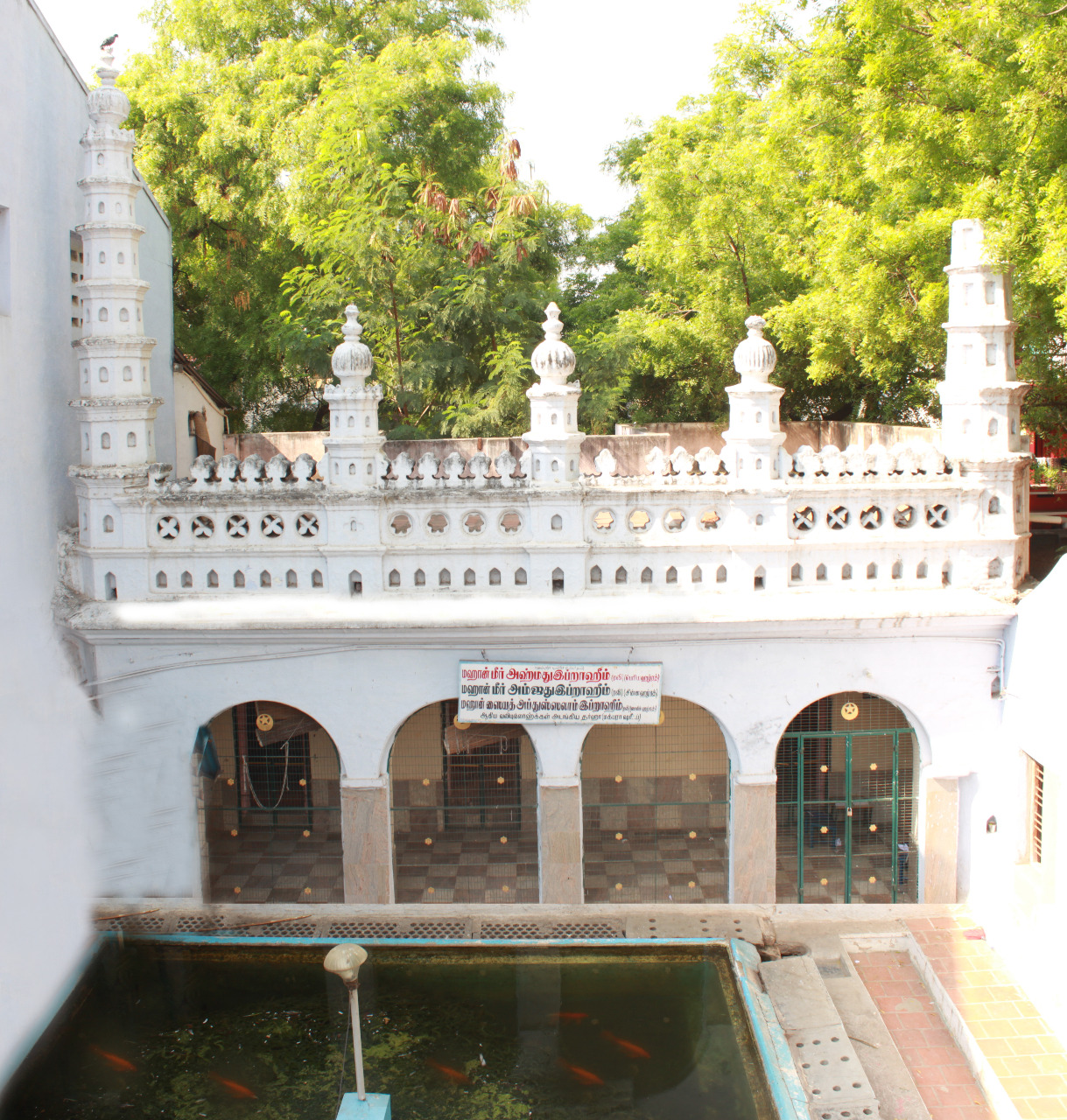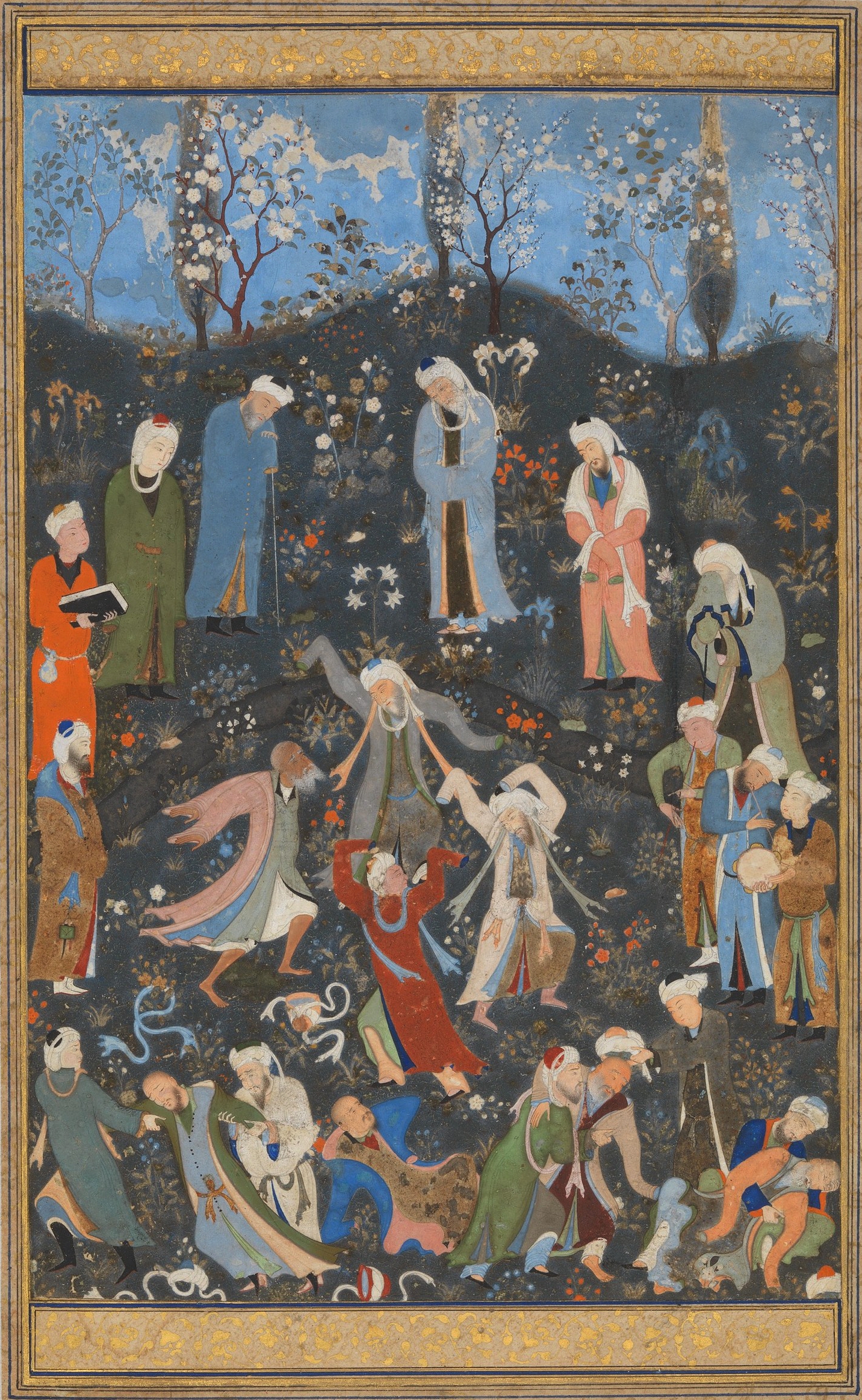|
Maqbara
The Arabic word ''Maqbara'' ( "mausoleum"; ''plural'': ''Maqâbir'') is derived from the word Qabr, which means grave. Though maqbara refers to the graves of all Muslims, it refers especially to a Muslim cemetery. In some Islamic cultures (especially Indo-Pak-influenced) it refers also to the graves (Raula or Rauza) of religious figures or Waliyullahs considered to have dedicated their life to Islam, striving to be true Muslims and training others to follow Islam as preached by the Islamic prophet Muhammad. In Asian countries, maqbara also refers to the Dargah of Waliyullahs, Sufis, Sheikhs, Imams, Qutbs and Ghouses. There are many Dargahs of Waliyullahs all over India, and their maqbaras are found therein. Madurai Maqbara In Madurai, South Tamil Nadu, the term maqbara usually refers to the Dargahs of three saints: Meer Ahmad Ibrahim Waliyullah Al Kabir, Meer Amjad Ibrahim Waliyullah As Saghir, and Syed Abdus Salaam Ibrahim Saalim Waliyullah. The graves of all three sheikhs are ... [...More Info...] [...Related Items...] OR: [Wikipedia] [Google] [Baidu] |
Kazimar Big Mosque
Kazimar Periya Pallivasal or Kazimar Big Mosque is the oldest mosque in Madurai city, Tamil Nadu, India constructed in the year 1284AD (Hijri 683) and continues to be in existence for more than 7 centuries till today. The mosque was founded by Kazi Syed Tajuddin, a descendant of the Islamic prophet Muhammad, who came from Yemen during 13th century and received this land from the King Kulasekara Ku(n) Pandiyan. The mosque which was the first Muslim place of worship in Madurai. The mosque was managed by Syed Tajuddin during his lifetime followed by his children and descendants hereditarily for more than 7 centuries till today. Almost all of Kazi Syed Tajuddin's descendants (Huqdars of this mosque called as Syeds) have lived in the same locality ( Kazimar street) for more than 700 years, and have managed the mosque since then. The mosque, which can accommodate about 1,200 people, is within 500 metres of the Periyar (central) bus stand, within one kilometre southeast of Madurai J ... [...More Info...] [...Related Items...] OR: [Wikipedia] [Google] [Baidu] |
Dargahs In India
A dargah ( fa, درگاه ''dargâh'' or ''dargah'', Turkish: ''dergâh'', Hindustani: ''dargah'' दरगाह درگاہ, bn, দরগাহ ''dorgah'') is a shrine or tomb built over the grave of a revered religious figure, often a Sufi saint or dervish. Sufis often visit the shrine for ziyarat, a term associated with religious visits and "pilgrimages". Dargahs are often associated with Sufi eating and meeting rooms and hostels, called ''khanqah'' or hospices. They usually include a mosque, meeting rooms, Islamic religious schools (madrassas), residences for a teacher or caretaker, hospitals, and other buildings for community purposes. The same structure, carrying the same social meanings and sites of the same kinds of ritual practices, is called ''maqam'' in the Arabic-speaking world. Dargah today is considered to be place where saints prayed and mediated (their spiritual residence). Shrine is modern day building which encompasses of actual dargah as well but no ... [...More Info...] [...Related Items...] OR: [Wikipedia] [Google] [Baidu] |
Dargah
A dargah ( fa, درگاه ''dargâh'' or ''dargah'', Turkish: ''dergâh'', Hindustani: ''dargah'' दरगाह درگاہ, bn, দরগাহ ''dorgah'') is a shrine or tomb built over the grave of a revered religious figure, often a Sufi saint or dervish. Sufis often visit the shrine for ziyarat, a term associated with religious visits and "pilgrimages". Dargahs are often associated with Sufi eating and meeting rooms and hostels, called ''khanqah'' or hospices. They usually include a mosque, meeting rooms, Islamic religious schools (madrassas), residences for a teacher or caretaker, hospitals, and other buildings for community purposes. The same structure, carrying the same social meanings and sites of the same kinds of ritual practices, is called '' maqam'' in the Arabic-speaking world. Dargah today is considered to be place where saints prayed and mediated (their spiritual residence). Shrine is modern day building which encompasses of actual dargah as well but ... [...More Info...] [...Related Items...] OR: [Wikipedia] [Google] [Baidu] |
Ziyarat
In Islam, ''ziyara(h)'' ( ar, زِيَارَة ''ziyārah'', "visit") or ''ziyarat'' ( fa, , ''ziyārat'', "pilgrimage") is a form of pilgrimage to sites associated with Muhammad, his family members and descendants (including the Shī'ī Imāms), his companions and other venerated figures in Islam such as the prophets, Sufi auliya, and Islamic scholars. Sites of pilgrimage include mosques, maqams, battlefields, mountains, and caves. ''Ziyārat'' can also refer to a form of supplication made by the Shia, in which they send salutations and greetings to Muhammad and his family. Terminology ''Ziyarat'' comes from ar, زَار, zār "to visit". In Islam it refers to pious visitation, pilgrimage to a holy place, tomb or shrine.Gibb, H. A. R.; Kramers, J. H.; Lévi-Provençal, E.; Schacht, J.; Lewis, B.; Pellat, Ch., eds. (1960). ''The Encyclopaedia of Islam, New Edition'', Volume I: W–Z. Leiden: E. J. Brill. pp. 524, 533–39. . Iranian and South Asian Muslims use the wor ... [...More Info...] [...Related Items...] OR: [Wikipedia] [Google] [Baidu] |
Madurai
Madurai ( , also , ) is a major city in the Indian state of Tamil Nadu. It is the cultural capital of Tamil Nadu and the administrative headquarters of Madurai District. As of the 2011 census, it was the third largest Urban agglomeration in Tamil Nadu after Chennai and Coimbatore and the 44th most populated city in India. Located on the banks of River Vaigai, Madurai has been a major settlement for two millennia and has a documented history of more than 2500 years. It is often referred to as "Thoonga Nagaram", meaning "the city that never sleeps". Madurai is closely associated with the Tamil language. The third Tamil Sangam, a major congregation of Tamil scholars said to have been held in the city. The recorded history of the city goes back to the 3rd century BCE, being mentioned by Megasthenes, the Greek ambassador to the Maurya empire, and Kautilya, a minister of the Mauryan emperor Chandragupta Maurya. Signs of human settlements and Roman trade links dating back ... [...More Info...] [...Related Items...] OR: [Wikipedia] [Google] [Baidu] |
Sufi Shrines In India
Sufism ( ar, ''aṣ-ṣūfiyya''), also known as Tasawwuf ( ''at-taṣawwuf''), is a mystic body of religious practice, found mainly within Sunni Islam but also within Shia Islam, which is characterized by a focus on Islamic spirituality, ritualism, asceticism and esotericism. It has been variously defined as "Islamic mysticism",Martin Lings, ''What is Sufism?'' (Lahore: Suhail Academy, 2005; first imp. 1983, second imp. 1999), p.15 "the mystical expression of Islamic faith", "the inward dimension of Islam", "the phenomenon of mysticism within Islam", the "main manifestation and the most important and central crystallization" of mystical practice in Islam, and "the interiorization and intensification of Islamic faith and practice". Practitioners of Sufism are referred to as "Sufis" (from , ), and historically typically belonged to "orders" known as (pl. ) – congregations formed around a grand who would be the last in a chain of successive teachers linking back to Muha ... [...More Info...] [...Related Items...] OR: [Wikipedia] [Google] [Baidu] |
Maqam (shrine)
A Maqām ( ar, مقام) is a shrine built on the site associated with a religious figure or saint, typical to the regions of Palestine and Syria. It is usually a funeral construction, commonly cubic-shaped and topped with a dome. Maqams are associated with Muslim traditions, but many of them are rooted in ancient Semitic, Jewish, Samaritan and Christian traditions. During the 19th century, Claude Reignier Conder described maqams as an essential part of folk religion in Palestine, with locals attaching "more importance to the favour and protection of the village Mukam than to Allah himself, or to Mohammed his prophet".Conder, 1877, pp8990: "In their religious observances and sanctuaries we find, as in their language, the true history of the country. On a basis of polytheistic faith which most probably dates back to pre-Israelite times, we find a growth of the most heterogeneous description: Christian tradition, Moslem history and foreign worship are mingled so as often to be e ... [...More Info...] [...Related Items...] OR: [Wikipedia] [Google] [Baidu] |
Sufis
Sufism ( ar, ''aṣ-ṣūfiyya''), also known as Tasawwuf ( ''at-taṣawwuf''), is a mystic body of religious practice, found mainly within Sunni Islam but also within Shia Islam, which is characterized by a focus on Islamic spirituality, ritualism, asceticism and esotericism. It has been variously defined as "Islamic mysticism",Martin Lings, ''What is Sufism?'' (Lahore: Suhail Academy, 2005; first imp. 1983, second imp. 1999), p.15 "the mystical expression of Islamic faith", "the inward dimension of Islam", "the phenomenon of mysticism within Islam", the "main manifestation and the most important and central crystallization" of mystical practice in Islam, and "the interiorization and intensification of Islamic faith and practice". Practitioners of Sufism are referred to as "Sufis" (from , ), and historically typically belonged to "orders" known as (pl. ) – congregations formed around a grand who would be the last in a chain of successive teachers linking back to Muhamm ... [...More Info...] [...Related Items...] OR: [Wikipedia] [Google] [Baidu] |
List Of Islamic Shrines In Tamil Nadu
{{Use Indian English, date=July 2020 This is a list of notable Islamic shrines in Tamil Nadu, a state of India. * Trichy Darga - Thable Aalam Basha aka Nathar Shah Walliyullah * Erwadi Dargah -Qutbus Sultan Syed Ibrahim shaheed Badusha * Kattupalli -A compound of dargahs - Ervadi. * Nagore Dargah -Abdul Qadir Shahul Hameed Qadir Badusha Wali * Pallapatti - Sheik Abdul Kadhar Avliya- Pallapatti * Goripalayam Darga - Goripalayam Darga * Hazrat Noor Mohammad Shah Dargah - Podakkudi and Panruti Darga * Kovalam Darga - Kovalam Darga, Chennai * Kunangudi Masthan Sahib - Kuangudi Mastan Sahib Darga, Thondiarpet * Muthupet dargha, Sheik Dawood Kamlil Valyullah Dargah * Syek Appa Shek Amma Oliyulla Dargah, Maavoor, Thondi Road, Ramanathapuram District * Sheikh Sadaqathullahil Khahiri Dargah, Keelakarai * Sheikh Umarul Khahiri Valiyyullah Dargah, Kayal Pattanam * Sheikh Keelakarai Thaika Swahib and Imamul Aroos Mappilai Labbai Alim Dargah, Meletheru, Keelakarai *Lalpet Dargah of 20h C ... [...More Info...] [...Related Items...] OR: [Wikipedia] [Google] [Baidu] |
Khwaja Khizr Tomb
Khwaja Khizr Tomb is a maqbara located at Jatwara, Sonipat, National Capital Region, India. It was built by Ibrahim Lodi Ibrahim Khan Lodi (or Lodhi) (Pashto: ابراهیم خان لودي), (1480 – 21 April 1526) was the last Sultan of the Delhi Sultanate, who became Sultan in 1517 after the death of his father Sikandar Khan Lodi. He was the last ruler of th ... in the memory of Khwaja Khizr, the son of Darya Khan, during the period . References Buildings and structures completed in 1524 Buildings and structures in Haryana Islamic architecture Architecture of the Lodi dynasty Sonipat Tombs in India Tourist attractions in Haryana {{cemetery-stub ... [...More Info...] [...Related Items...] OR: [Wikipedia] [Google] [Baidu] |
Sheikhs
Sheikh (pronounced or ; ar, شيخ ' , mostly pronounced , plural ' )—also transliterated sheekh, sheyikh, shaykh, shayk, shekh, shaik and Shaikh, shak—is an honorific title in the Arabic language. It commonly designates a chief of a tribe or a royal family member in Arabian countries, in some countries it is also given to those of great knowledge in religious affairs as a surname by a prestige religious leader from a chain of Sufi scholars. It is also commonly used to refer to a Muslim religious scholar. It is also used as an honorary title by people claiming to be descended from Hasan ibn Ali and Husayn ibn Ali both patrilineal and matrilineal who are grandsons of the Islamic prophet Muhammad. The term is literally translated to "Elder" (is also translated to "Lord/ Master" in a monarchical context). The word 'sheikh' is mentioned in the 23rd verse of Surah Al-Qasas in the Quran. Etymology and meaning The word in Arabic stems from a triliteral root connected with ... [...More Info...] [...Related Items...] OR: [Wikipedia] [Google] [Baidu] |









